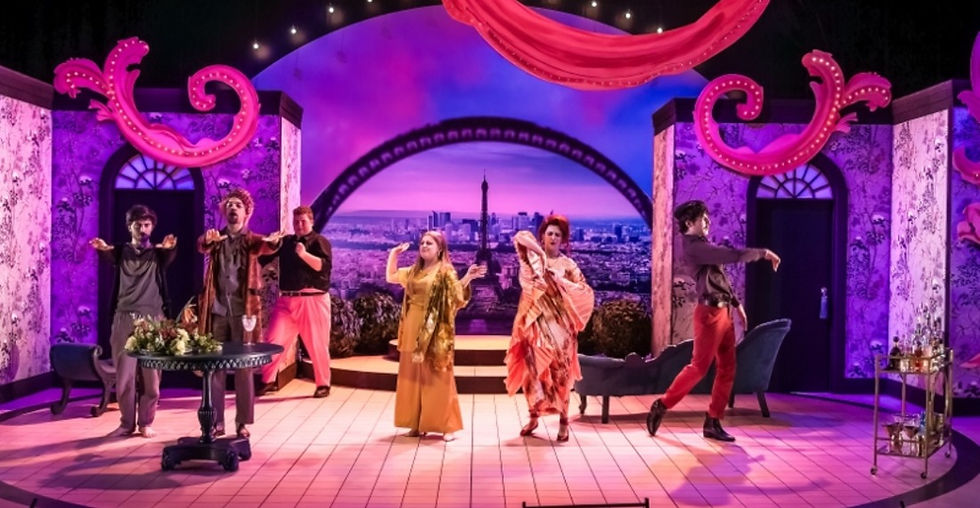Foppa and Rossini
Royal Northern College of Music
RNCM Opera Theatre
March 17-23, 2024: 1 hr 55 mins


La scala di seta (The Silken Ladder) is a one-act comedic opera for six characters, of a sort the Italians called farsa at the time (1812). And director Robert Chevara takes it as basic that farce is the model to follow if you do it today.
He’s not wrong. The story’s ridiculous, but it works well on a set (by Jess Curtis) with five doors at the back, the better for people to nip in and out of, and a few simple props, the better for them to “hide” behind – it’s that sort of plot.
We’re in Paris: a small-size Eiffel Tower near the front of the stage makes that clear, and the time is the present. Costumes are flattering and neatly cut, but in a colour palette that’s lurid and possibly indicates that everything takes place in an alcoholic haze (there’s a prominent drinks trolley from which several characters partake as it goes on).
The ladder of the title is one that’s used by Dorvil, the tenor, secretly married to our heroine Giulia, to sneak up to her room undiscovered. She’s the ward of Dormont, who thinks she should be getting married to his mate (and Dorvil’s), Blansac. Her friend Lucilla actually loves Blansac (goodness knows why), and Germano the servant wants to help but gets things hopelessly mixed up every time he tries.
At the outset we see a stout and substantial metal ladder at the front of the stage, resting in the orchestra pit, but in the second part it’s apparently changed to be made of silk and has migrated to the back. Don’t ask.
It’s not often the Royal Northern College goes for a piece with so few characters in it (and no chorus), but as usual it’s double-cast (I saw the “blue” line-up), so 12 of their vocal students get a chance to show what they can do with roles that demand as much acting ability as vocal prowess.
The conductor on the night I saw it was Matteo Dal Masso, an experienced musician studying for his masters degree in conducting at the RNCM. He proved himself a true master of his art, picking engaging and vivacious tempi throughout with plenty of flexibility, getting precision playing from the RNCM Opera Orchestra, and remaining sympathetic and helpful to his singers at every turn. The conductor at the other performances was Wyn Davies.
A duet near the start establishes a relationship between mistress and servant, Giulia and Germano, which begins to set up the plot, as he puts two and two together and gets anything but four. Maeve Herd, in her first leading operatic role, has some lovely tone and can characterise at the same time as producing that tone. She also showed off her high notes, while Matthew Secombe, as Germano, had his own best opportunity near the end of the show.
There is also a brief showpiece for Lucilla, in this case Rosa Sparks (who was Emmie in Opera North’s recent Albert Herring in Leeds), which calls for a big range and some virtuosity; and Liam Forrest proved his excellent intonation throughout. Brennan Alleyne brought a light and attractive tenor and stage assurance to Dormont, and William Jowett, with an almost John Cleese-like physical presence, was effective as the would-be wooer Blansac.
There was no credit for movement direction, but Chevara not only placed his protagonists cleverly around the stage but also had them indulge in a bit of lively dancing at the end, which brought the entire business to a cheer-earning conclusion.






